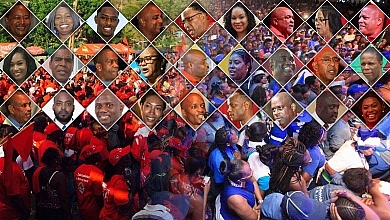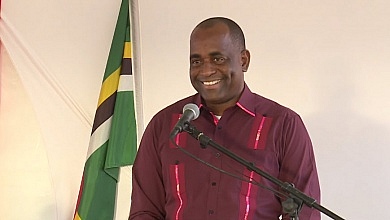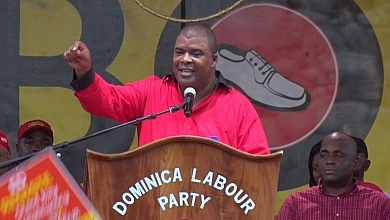On June 1, 2025, the Dominica Labour Party (DLP) marked its 70th anniversary with a vibrant rally in the northwestern village of Dublanc. At face value, the event was a grand celebration of a party that has profoundly shaped Dominica’s political, economic, and social life. But the rally carried an unmistakable undertone beneath the music, speeches, and stage lighting: this was more than a milestone; it was a message. The DLP is not just celebrating history but preparing for another chapter at the helm. Whether the nation realises it or not, the shadow of the next general election loomed large over Dublanc.
A Legacy Framed in Power
Dominica’s political landscape is unique in the region for its long-standing dominance by a single party in modern times. That the Labour Party can stand before its supporters and declare 70 years of existence, accompanied by two decades of uninterrupted governance, is a feat few parties in the Caribbean or beyond can claim. The Dublanc rally leaned heavily into this narrative of continuity, loyalty, and unbroken legacy.
Prime Minister Roosevelt Skerrit, now the region’s most electorally seasoned leader, spoke of unity, vision, and a Labour Party “that belongs to the people.” But as with most high-profile DLP events in recent years, unity often feels synonymous with dominance. The framing was clear: Labour has brought progress; Labour deserves your loyalty; and any challenge to that loyalty is not just political opposition, it is disruption.
Why Dublanc? The choice of location was deliberate. Dublanc is a small but historically significant community for the Labour movement. Holding the rally there allowed the party to wrap its message in rural authenticity, invoking both grassroots strength and national reach. A mobile stage, thousands in attendance, coordinated speaker slots, and live national broadcast transformed the village into a political amphitheater.
Every element, the red attire, synchronized crowd chants, social media hashtags, felt not just commemorative, but campaign-ready. There were clear signs that this was more than a look back; it was a well-staged pivot toward what lies ahead.
Mia Mottley and the Regional Signal
One of the most talked-about moments was the keynote address delivered by Barbados Prime Minister Mia Mottley. Her presence added regional weight to the rally, and her message, a call for Dominicans to “protect leadership and country”, resonated far past the island’s shores. Mottley spoke of shared struggles, legacy, and the need to preserve visionary governance.
But her speech, while warmly received, also subtly framed the DLP’s leadership as irreplaceable. In praising Skerrit’s stewardship, she hinted at a regional endorsement of continuity, not contest. Observers may rightly ask: was this a message of regional solidarity or political reinforcement?
A Cast of Familiar Faces
The speakers’ lineup was telling. Alongside Skerrit and Mottley were several ministers of government and DLP loyalists: Oscar George, Kent Edwards, Denise Charles, Gregory Riviere, and former candidate Lynsia Frank. Their messages echoed a common refrain, progress, transformation, and gratitude for the DLP’s leadership.
This was not a platform for critical reflection or broad civic dialogue. It was a rallying call for consolidation. Those who took the stage were either incumbents or rising figures aligned tightly with party structures. No space was made for community voices or independent civic actors. The narrative was managed and unified: DLP is the past, present, and future.
The Political Calendar’s Quiet Echo
While no date for a general election has been announced, few in Dominica believe that the rally’s timing is coincidental. National rallies like these often serve as unofficial litmus tests for public mood and internal readiness. The sheer scale of logistics and messaging at Dublanc suggests the party is not just reflecting, it is preparing.
A year or more may still remain before Dominicans next head to the polls, but the atmosphere already hints at pre-campaign positioning.
The rally reaffirmed Labour’s electoral machinery is active, mobilized, and confident in its ability to dominate the public narrative before opposition forces can coalesce.
As structured as the event was, its omissions spoke volumes. There was little mention of ongoing social unease over the cost of living. The rally didn’t reference the Build Change report showing widespread housing vulnerability or the Dominica Public Service Union’s stalled salary negotiations. These issues may be known, but in Dublanc, they were tucked away. That absence reflects the core challenge of such events. They showcase power, but risk sounding tone-deaf.
The narrative was one of gratitude and loyalty, but not shared hardship or collective problem-solving. It’s one thing to celebrate history; it’s another to wrestle with the present, especially when many citizens remain uncertain about their economic futures.
Opposition, Silence, and the Space in Between
Interestingly, the rally made no reference to opposition parties, perhaps a deliberate choice to signal confidence or irrelevance. The United Workers’ Party, fragmented and largely absent from public debate in recent months, remains in retreat. But public silence does not equal public satisfaction.
A growing portion of the population remains disengaged from traditional political lines altogether. The DLP’s dominance has produced not just weak opposition, but a political vacuum where civic skepticism grows, especially among the youth. The question now is whether rallies like Dublanc speak to those citizens, or speak past them.
A Party Preparing Its Next Chapter
For its supporters, the Dublanc rally was a triumph, proof that the DLP remains strong, visionary, and in control of its legacy. For critics, it may be seen as an orchestrated performance reinforcing a political monopoly. For others, it is both: a moment of national pride and a reminder that the lines between party and state continue to blur.
Either way, what happened in Dublanc should not be dismissed as merely a celebration. It was a signal. It reaffirmed that the Labour Party is not simply looking back at 70 years of service, it is aiming forward, toward another election, and likely another victory.
What remains to be seen is whether this dominance breeds deeper public engagement, or deeper public silence.
This article is copyright © 2025 DOM767








